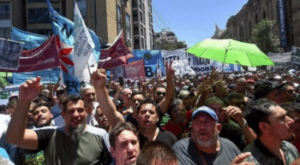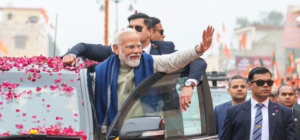V. Arun Kumar
“Sarfaroshi ki tamanna ab hamare dil mein hai, Dekhna hai zor kitna baazu-e-qatil mein hai” [The desire for revolution is in our hearts, we shall see how much strength lies in the arms of the enemy]. On Friday, November 29, the whole of Pakistan reverberated with this revolutionary poem written by Bismal Azimabadi in 1921, as students marched across the country for their rights.
The call for students solidarity march was given last month by leftist student organisations including the Progressive Students Collective (PSC), the Progressive Students Federation (PRSF) and the Revolutionary Students Front (RSF). The organisations demand the repeal of a three-decade-old ban on student unions in universities and an end to the privatisation of education.
Their call to mobilisation was adopted on a national level, and many more students organisations, trade unions, and civil society members began extending their solidarity with the students march.
A young student, Sahar from Karachi speaking to Peoples Dispatch said that she participated in the march because “private universities keep on increasing their fees and the government is doing nothing but suppressing the voices of students who speak against it.”
The participation in the students’ march on Friday was unprecedented, not only in terms of numbers but the expansiveness. In the most remote corners of Pakistan, university students participated in the Students Solidarity March. Activists report that mobilisations were held in more than 40 cities.
Students across the world have been on the front lines of mobilisations against neoliberalism and the rise of the right. In the capital city of Islamabad, one banner read, “Students of the world unite, you have nothing to lose but debts, loans and privatisations.”
Suppressing students’ voices
The ban on student unions was imposed in 1984 by Pakistan’s military dictator Zia-Ul-Haq in an attempt to suppress resistance against the dictatorship. Students and workers were in the forefront of struggle against the brutal regime of Zia-Ul-Haq. This ban was briefly lifted in 1988 by prime minister Benazir Bhutto but the Supreme Court re-imposed the ban in 1993. Successive governments have used this ban to repress students’ voices demanding education for all, but today, students are rising up.
One participant in Friday’s mobilisation said that to them, student unions are nurseries which equip students with the ability to think critically and to develop opinions. The violence that occurs on campuses is not because of the political activities organised by students, but due to the presence of regressive ideologies that believe in suppressing critical thinking.
Workers and students united
Hundreds of people from the education sector, trade unions, professional organisations and members of civil society joined the march calling for ‘Azaadi’ [freedom] from fees hike and privatisation.
“We, the students and workers are united against the system of privatisation, and we will see how they [elities] will stop our rage,” said Waqar, member of student wing of Mazdoor Kisan Party (MKP) speaking to Peoples Dispatch.
“One day this wave of students and workers will drown the rich and the elites and establish a world of working class and poor,” said Waqar.
The students are also demanding the allocation of at least 5% of the total GDP for education and the end of the militarisation of campuses. Pakistan’s intelligence agencies are notoriously known for kidnapping students and activists who express their dissent against the policies of the government and military.
Students note that education in Pakistan has always been for the rich, but the policies of the new government of Imran Khan’s Pakistan Tehreek-e-Insaf (PTI) have exacerbated the situation and higher education is even more inaccessible for the poor. In a budget announced on June 11, 2019, the government imposed a massive cut of 37% to the higher education development budget.
(V. Arun Kumar is a journalist with People’s Dispatch. People’s Dispatch is an international media organisation whose mission is to highlight voices from people’s movements and organisations across the globe.)




